初一英语期中复习计划
初一英语复习计划

初一英语复习计划初一英语复习计划一一、复习中注意的几个原则:1、是抓住课本,有效复习。
教材和教学大纲是考前复习和考试命题的依据。
2、是系统归纳,分清脉络。
3、是专项练习,有的放矢。
二、具体计划如下:1、单词的复习201x人教版的教材的主要特点是词汇量很大,词汇是学习英语的基础,所以学习英语从掌握词汇入手。
在进入正式复习前,我组织了单词听写大赛,激发孩子们认真记单词的积极性。
所以,在正式复习开始后,我会坚持每天听写单词,并且把单词归类让学生更容易掌握。
2、语法知识的复习七年级上册书中强调的语法知识有:一般现在时、名词的复数形式、名词所有格、实义动词、数词(基数词和序数词)、一般疑问句、特殊疑问句等。
我计划对语法知识进行全面的总结,并配合大量的练习,大范围的让学生懂得语法并会用语法。
这样,或许可以减少学生心里的模糊知识。
3、练习题的设置这次复习时间只有两个星期,时间紧,内容多,容量大。
所以,我打算以单元为基准,精选试题进行强化训练,尤其在学生容易出错的知识点上,多加巩固。
三、对不同学生进行必要的分类指导和心理辅导。
一个班级,总是存在着学生的差异。
在复习中,用一个标准来要求所有学生,是不太妥当的。
对优生而言,严格要求,加大难度;对中等生、一般学生而言,要求他们巩固所学,力求进步;对后进生而言,应耐着性子,加大情感投入,让他们体会到老师们的良苦用心,尽可能搞好学习。
初一英语复习计划二九年级英语总复习课由于时间受到严格控制,要在短短的三个多月时间里完成初中三个学年所学到的全部知识,并非轻而易举的事。
再者,市教育局对于各校中考评比是以三率(优秀率、优良率、及格率)及其综合比为依据,所以复习要有针对性和时效性,所拟订的总复习的过程应体现分层次教学,以提高三率综合比。
复习过程传统地分为以下三个阶段。
(即:第一阶段是教材梳理,第二阶段是专项复习,第三阶段是模拟训练和综合训练:以普教室的《中考新探索》为主要训练材料。
初一英语复习计划

初一英语复习计划英语作为一门重要的外语,对于我们的学习和未来有着极其重要的影响。
初一是一个语言基础打下的阶段,因此制定一个合理的英语复习计划对于我们初中这三年的英语学习至关重要。
下面是我个人的初一英语复习计划,希望对大家有所帮助。
一、听说训练在初一这个阶段,培养良好的听力和口语能力非常重要,它们是整个英语学习过程的基石。
因此,我将安排每天至少30分钟的听说训练时间。
我会选择一些英语歌曲、纯英语电影或者BBC新闻来提升自己的听力水平。
同时,我也会找一些英语口语练习的网站或者APP来提高口语表达能力。
我会尽量找机会和同学们进行英语口语交流,增强自己的表达能力。
二、词汇积累词汇是英语学习的基础,初一的阶段词汇量相对较少,因此我决定每天抽出30分钟的时间来进行词汇积累。
我会根据自己的学习进度,每天选择一定数量的单词进行学习。
我会使用一些词汇记忆软件或者制作自己的单词卡片来帮助记忆。
除了掌握单词的拼写和发音,我还将学习它们的词性、用法和搭配。
这样不仅能够扩充自己的词汇量,同时也能更好地理解和运用这些单词。
三、语法练习初一阶段的英语语法主要是基础知识的学习和掌握。
为了加强自己的语法能力,我计划每周安排两次的语法练习时间,每次约30分钟。
我会通过做题和阅读相关的语法规则来帮助自己理解和记忆语法知识。
同时,我也会尝试用英语写一些简单的句子和段落来巩固所学的语法知识。
四、阅读训练英语阅读是扩大词汇量、提高语感和理解能力的重要途径。
为了提高自己的阅读水平,我计划每天抽出30分钟的时间进行英语阅读。
我会选择一些适合初一水平的英语故事、文章或者英语杂志来进行阅读。
在阅读过程中,我会注意理解文章的大意和细节,并学习一些常见的阅读技巧,如猜词义、推断作者意图等。
五、写作练习初一阶段的写作主要以日常生活为主题,包括自我介绍、家庭、学校、节日等。
为了提高自己的写作能力,我计划每周进行一到两次的写作练习,每次约30分钟。
我会选择一些与自己生活相关的话题,进行小短文或者作文的写作。
人教版7年级英语下册期中考试前复习计划

人教版7年级英语下册期中考试前复习计划全文共6篇示例,供读者参考篇1Certainly! Here's a 2000-word article on a "Review Plan for the 7th Grade English Textbook (2nd Semester) Final Exam" written from a student's perspective, using an appropriate language style for a middle school student:The Final Exam is Coming! My Review Plan for the 7th Grade English Textbook (2nd Semester)Hey there, fellow English learners! It's me, your friendly neighborhood student, and I've got some exciting news to share with you. Can you guess what it is? That's right, the final exam for our 7th Grade English textbook (2nd semester) is just around the corner! Yikes, I know, I know, exams can be super scary, but fear not, my friends. I've got a foolproof plan to help us all ace this thing like the English champs we are!First things first, let's talk about the importance of staying motivated. I won't lie to you, reviewing for an exam can be a real drag sometimes. There might be days when you just want to throw in the towel and binge-watch your favorite shows instead.But trust me, the feeling of accomplishment you'll get after acing that exam is going to be way better than any TV show. So, let's make a pact right here, right now. We're going to stick together, encourage each other, and stay on track with our review plan. Deal? Deal!Now, let's dive into the nitty-gritty of this review plan. We've got a lot of ground to cover, but don't worry, I've got your back. First up, we need to go over all the vocabulary words we've learned throughout the semester. I know, I know, memorizing words can be a real snooze-fest, but it's super important. How about we make it a game? Let's see who can come up with the most creative way to remember those tricky words. Maybe we can create silly rhymes or act them out in charades? The possibilities are endless!Next on the agenda, we've got grammar rules. Ah, yes, the bane of every English learner's existence. But fear not, my friends, for we shall conquer these pesky rules once and for all! Let's break them down into manageable chunks and tackle them one by one. Perhaps we could create a fun grammar rap or song to help us remember the rules? I'm just spitballing here, but you get the idea. Making it fun and engaging is key!Writing is another crucial aspect of our exam, so we'll need to dedicate some serious time to honing our skills in that department. Let's revisit all the different writing styles we've learned, like narrative, descriptive, and persuasive writing. We could even have a writing workshop where we share our work and give each other feedback. Imagine how awesome our writing will be by the time the exam rolls around!Last but not least, we can't forget about speaking and listening comprehension. These skills are just as important as the others, so we'll need to practice, practice, practice! How about we have regular conversation sessions where we take turns asking and answering questions? We could even role-play different scenarios to really put our skills to the test.Phew, I know that's a lot to take in, but don't worry, we've got this! Just remember, the key to success is consistency and persistence. Let's commit to reviewing a little bit each day, and before we know it, that final exam will be a piece of cake.Oh, and one more thing – don't forget to take breaks and have fun along the way! Learning should be enjoyable, not a chore. Maybe we could plan a celebratory movie night or pizza party once the exam is over? Just a thought!Alright, my fellow English warriors, that's my review plan in a nutshell. Are you ready to tackle this exam head-on? I know I am! Let's do this thing together and show everyone just how awesome we are. Who's with me? Let's go get 'em!篇2Title: My Awesome Review Plan for the 7th Grade English Mid-Term ExamHey there, fellow 7th graders! It's your pal here, ready to share my super awesome review plan for the upcomingmid-term exam. I know, I know, exams can be a real drag, but fear not! With a little bit of planning and some serious dedication, we can conquer this challenge like true champions!First things first, let's talk about the importance of having a solid review plan. You see, without a plan, it's easy to get lost in the sea of information we need to cover. It's like trying to find your way through a maze without a map – you'll end up going around in circles and getting nowhere fast. But with awell-crafted plan, we can stay focused and organized, ensuring that we cover all the important topics and leave no stone unturned.Now, let's dive into the nitty-gritty of my review plan. Grab a pen and paper (or your trusty digital device, if you're atech-savvy whiz), and let's get started!Step 1: Gather Your MaterialsBefore we can begin our review, we need to gather all the necessary materials. This includes our English textbook, notebooks, any handouts or supplementary materials provided by our awesome teacher, and perhaps a few colorful highlighters or sticky notes to help us stay organized.Step 2: Break It DownNext, we'll need to break down the content we need to cover into manageable chunks. Our English textbook is divided into different units, each covering specific topics and language skills. Let's make a list of all the units we've covered so far, and prioritize the ones that seem more challenging or important.Step 3: Create a ScheduleNow that we have our list of topics to review, it's time to create a schedule. Personally, I like to allocate specific days or blocks of time for each unit or topic. For example, Monday could be dedicated to reviewing Unit 1, Tuesday for Unit 2, and so on.This way, we can stay focused and avoid feeling overwhelmed by trying to tackle everything at once.Step 4: Practice, Practice, PracticeReviewing is all well and good, but true mastery comes from putting what we've learned into practice. For each unit or topic, try to incorporate different types of practice exercises. This could include:Reading comprehension passages and answering questionsWriting short essays or paragraphs on given topicsPracticing dialogues or conversations with a friend or family memberCompleting grammar exercises or vocabulary drillsDon't be afraid to get creative and mix things up to keep the review process engaging and fun!Step 5: Test YourselfAs we progress through our review, it's important to periodically test our knowledge. This will help us identify any areas where we might need extra practice or clarification. You can create your own practice quizzes or tests, or even ask a friend or family member to quiz you on different topics.Step 6: Seek Help When NeededLet's be real – there might be some concepts or topics that just seem to elude our understanding, no matter how hard we try. That's totally okay! Don't be afraid to seek help from your teacher, classmates, or even online resources. Asking for help is a strength, not a weakness, and it can make all the difference in solidifying your understanding.Step 7: Take Breaks and Stay MotivatedReviewing for an exam can be mentally taxing, so it's crucial to take breaks and stay motivated throughout the process. Schedule regular breaks to rechargeyour batteries, whether it's going for a quick walk, listening to some upbeat music, or indulging in a healthy snack. Celebrate your small wins along the way, and remind yourself of how far you've come and how much you've learned.Step 8: Get Plenty of RestLast but certainly not least, make sure you get plenty of rest leading up to the exam. A well-rested mind is a sharp mind, and you'll need all your mental faculties firing on all cylinders come test day. Aim for at least 8 hours of sleep each night, and try toavoid any late-night cramming sessions, as they can do more harm than good.And there you have it, my friends – my awesome review plan for the 7th grade English mid-term exam! Remember, the key to success is staying organized, practicing regularly, and not being afraid to ask for help when you need it. With this plan in hand, you'll be well on your way to acing that exam and celebrating your hard-earned accomplishments.So, what are you waiting for? Grab that textbook, sharpen those pencils, and let's get reviewing! Together, we've got this in the bag. Good luck, and happy studying!篇3Hey there, fellow 7th graders! As we all know, our mid-term exams are just around the corner, and that means it's time to buckle down and start studying. I know, I know, studying isn't exactly the most exciting thing in the world, but trust me, it's way better than feeling completely lost during the exam. Plus, if we do well, we'll get to enjoy our winter break without any nagging from our parents or teachers!Now, let's talk about our English textbook, shall we? I know it might seem like a lot to cover, but don't worry, I've got a planthat'll help us tackle it like champs. First things first, let's break it down into manageable chunks.Unit 1: It's all about introductions and greetings, right? Let's start by practicing some basic conversation starters. "Hello, my name is..." "Nice to meet you!" "Where are you from?" Easy peasy! We can even role-play with our friends or family members to get more comfortable.Unit 2: Ah, yes, the dreaded topic of school life. But fear not, my friends! We can conquer this beast by making flashcards for all those tricky vocabulary words like "classroom," "homework," and "subject." And let's not forget to practice those dialogues about our daily routines and favorite subjects. Bonus points if you can act them out with your best dramatic flair!Unit 3: Ah, the great outdoors! Who doesn't love talking about nature and animals? Let's start by learning the names of different plants and creatures in English. We can even make a game out of it by drawing silly pictures or creating anature-themed memory game. And don't forget to practice those "can" and "can't" sentences when talking about abilities and actions.Unit 4: Time for some fun with food and drinks! We can start by making a list of all our favorite snacks and beverages inEnglish. Then, we can practice ordering at a restaurant or café by role-playing with our friends. And let's not forget those pesky countable and uncountable nouns – we can make up silly songs or raps to help us remember the rules.Unit 5: Ah, sports and hobbies – the perfect excuse to get up and move around! Let's start by learning the names of different sports and activities in English. Then, we can practice talking about our favorite pastimes using phrases like "I like to..." and "I enjoy..." We can even act out some of these activities to really get into the spirit!Unit 6: Time to talk about the weather and seasons. We can start by making a colorful poster or collage with pictures representing different weather conditions and seasons. Then, we can practice describing the weather using phrases like "It's sunny/rainy/cloudy..." and talking about our favorite seasons and why we love them.Unit 7: Ah, the final unit – all about shopping and clothes. Let's start by learning the names of different clothing items in English. We can even have a fashion show where we describe each other's outfits using adjectives like "stylish," "trendy," and "fashionable." And let's not forget to practice those tricky phrases for making requests and asking for prices.Now, I know that might seem like a lot to cover, but don't worry, we've got this! Remember, practice makes perfect, so let's try to incorporate English into our daily lives as much as possible. Watch movies or TV shows in English (with subtitles, of course篇4Exam Season is Approaching: My Revision PlanHey there, fellow students! It's me, your friendly neighborhood study buddy. With the second term English exam looming on the horizon, it's time to get our game faces on and start preparing! I know, I know, the thought of studying might not be the most exciting thing in the world, but trust me, a solid revision plan can make all the difference. So, let's roll up our sleeves and get down to business!First things first, let's talk about the importance of creating a revision schedule. We all know how easy it is to procrastinate and leave everything until the last minute. But let's be real, that's a recipe for disaster! Instead, we need to be strategic and allocate specific time slots for each topic or unit we need to cover. By breaking it down into manageable chunks, we'll be able to tackle the material without feeling overwhelmed.Now, let's dive into the nitty-gritty of what we need to cover for the exam. The PEP Edition Grade 7 textbook is packed with a variety of topics, from grammar rules and vocabulary to reading comprehension and writing tasks. It's essential to familiarize ourselves with the entire syllabus to ensure we don't leave any stone unturned.Grammar GurusGrammar is the backbone of any language, and English is no exception. We'll need to brush up on our knowledge of verb tenses, subject-verb agreement, parts of speech, and sentence structure. One fun way to practice grammar is by creating silly sentences or stories that incorporate the rules we're learning. Who knows, we might even come up with the next bestselling children's book!Vocab VanguardsExpanding our vocabulary is crucial for effective communication and comprehension. Let's make flashcards, play word games, or even create our own mini-dictionaries. The more words we know, the better we'll be able to express ourselves and understand what we're reading or listening to.Reading RockstarsReading comprehension is a vital skill that we'll need to master for the exam. We'll need to practice analyzing texts, identifying main ideas, making inferences, and understanding different types of questions. Reading aloud or discussing the texts with friends can be a great way to reinforce our understanding.Writing WarriorsFrom crafting narratives to composing essays, writing tasks are an integral part of the English exam. We'll need to focus on developing our ideas, organizing our thoughts, and using appropriate grammar and vocabulary. Regular writing practice and peer feedback can help us improve our skills and gain confidence.Listening LegendsListening comprehension can be a real challenge, but fear not! We'll practice listening to dialogues, conversations, and audio clips to sharpen our ears. Taking notes, predicting content, and discussing what we've heard can all contribute to our listening prowess.Speaking StarsOral communication is another essential aspect of the English exam. We'll need to practice speaking clearly, fluently, and confidently. Whether it's role-playing conversations, giving presentations, or participating in group discussions, every opportunity to speak will help us shine on the big day.Now, here's where the real fun begins – revision techniques! Let's get creative and make studying a bit more enjoyable. We could create mind maps, flashcards, or even songs and raps to help us remember key concepts. Study groups are also a fantastic way to stay motivated and learn from each other's strengths.Remember, Rome wasn't built in a day, and mastering English takes time and effort. But with dedication, perseverance, and a well-planned revision strategy, we'll be unstoppable! Let's embrace the challenge, support each other, and give it our all. Together, we'll conquer this exam and emerge as English language champions!篇5Here's a draft revision plan for the 7th grade English textbook (PEP edition) second semester midterm exam, writtenfrom the perspective of a middle school student in about 2000 words:Exam Prep Plan for 7th Grade English (Second Semester)Whew, the midterm exams are coming up soon! I really need to get my act together and do some solid review for English class. Mrs. Wang is a super nice teacher, but her tests are no joke. If I want to ace this one, I'd better make a good plan and stick to it.First up, vocabulary! We've covered so many new words this semester. I should start by going through all the word lists from each unit and making flashcards for any words I'm still shaky on. That includes the words for describing personalities, occupations, abilities, and more. Maybe I can even get my parents to quiz me.Next, I'll review the grammar points we've learned. Things like past tense, future tense with "will", comparatives and superlatives. Oh, and don't forget those pesky relative clauses! I always mix those up. I'll do some practice exercises and make sure I can use each grammar pattern correctly.Then it's on to reading comprehension. We've read quite a few longer passages and stories in class. I should re-read a few and practice answering the comprehension questions. Paying close attention to the details and making inferences fromcontext will be key. Maybe I can find some practice tests online too.Can't neglect listening, of course! I'll replay the listening exercises from the textbook and see if I can fill in the blanks accurately. Listening for key details like names, numbers, and important vocabulary is always tough. Building that skill will really help my score.Writing is probably the hardest part for me. We've had to write all sorts of things like emails, stories, and opinion pieces. I'll review the writing strategies we've learned, like using good examples and topic sentences. Then I'll try writing a practice piece for each type and have my parents give me feedback.Lastly, I absolutely have to practice speaking skills! We always have to answer oral questions during the exam. I'll think up some sample questions and responses, and practice saying them clearly. Maybe I can even do some role plays with my friend Li Ming over the phone. Nailing pronunciation and fluency will really boost my score.With all these things practiced over the next couple weeks, I'll be more than ready for the big test day! Just have to stay focused and put in the work. Yes, this review plan looks intense.But an A on the English midterm would be totally worth all the effort. Let's do this!篇6期中考试前复习计划嗨,大家好!我是小明,现在是7年级的学生。
初一英语上册期中考试复习计划篇三

初一英语上册期中考试复习计划篇三初一英语上册期中考试复习计划篇三「篇一」1、阶段训练(XX年3月初-4月底)指导思想:按教材内容顺序,抓纲靠本,使学生从零散知识的学习自然过渡到知识的系统归纳上,使基础知识更加条理化。
在材料的整体处理及时间分配上,我们拟订在三月初开始着手总复习,抓住课本,从初一开始,初一上下册花一个星期时间复习,从初二内容起两天复习一个单元,重要单词、词组、句子,让学生对照着去复习。
同时在课上老师按时态等把语法总结复习一下,再由老师针对学生的一些薄弱知识分单元编写一些练习讲义给学生加以练习,每个单元出一份练习,主要题型为:词组翻译、选择题、首字母填词、词语释义、词形转换、翻译句子等。
由于针对四月底的口语考试,在这段时间内,我们还要穿插进行口语的复习辅导,故大概在在四月底可以完成第一轮复习。
在教学方法的选用上,坚持打破传统的复习模式,不搞填鸭式、满堂灌,而是利用提问式、讨论式、辩论式、启发式等方法让学生归纳、总结,群策群力,互相补充或由师生共同归纳出各个阶段的知识要点、难点及考点。
让学生有思考的时间,有发言的权利,有查漏补缺的机会。
2、专项训练(20xx年5月初~5月底)指导思想:在阶段训练的基础上,进行语法专项练习并针对中考题型进行专项强化训练,提高对各种题型的解题能力。
针对中考题形进行分项练习,因此,结合我市的中考题型,对阅读理解、翻译句子、单项选择、对话缺词填空和书面表达等进行专项训练,并把重点放在学法的指导、解题技巧的点拨上,引导学生了解、熟悉各个题型的特点,强化分类练习。
3、模拟训练(20xx年6月)模拟训练是考前大练兵,是中考前的热身训练阶段。
运用一些模拟题,就模拟考试时间、考场要求、答题方式等,对学生进行应考、应试技巧的训练,反复培养学生的临场发挥能力和应变能力。
4、考前心理辅导(中考前)针对具体个性不同的学生,给予不同的心理辅导,排除他们的考前紧张心理。
初一英语上册期中考试复习计划篇三「篇二」广州中考寒假复习计划——英语每天看2篇短文同学们不妨在记忆单词上多下功夫。
七年级仁爱版英语复习计划
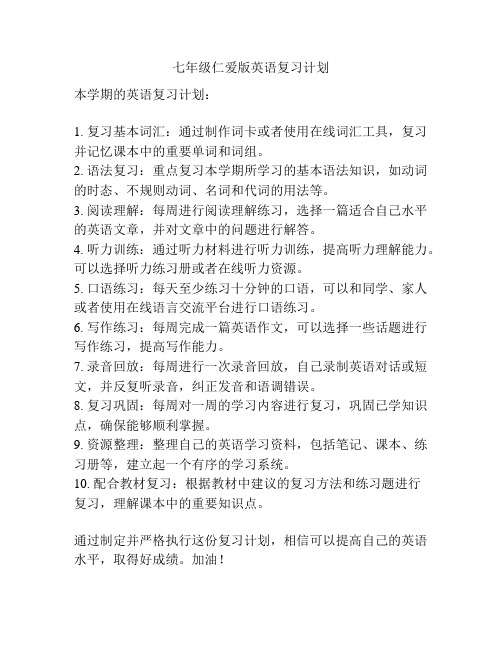
七年级仁爱版英语复习计划
本学期的英语复习计划:
1. 复习基本词汇:通过制作词卡或者使用在线词汇工具,复习并记忆课本中的重要单词和词组。
2. 语法复习:重点复习本学期所学习的基本语法知识,如动词的时态、不规则动词、名词和代词的用法等。
3. 阅读理解:每周进行阅读理解练习,选择一篇适合自己水平的英语文章,并对文章中的问题进行解答。
4. 听力训练:通过听力材料进行听力训练,提高听力理解能力。
可以选择听力练习册或者在线听力资源。
5. 口语练习:每天至少练习十分钟的口语,可以和同学、家人或者使用在线语言交流平台进行口语练习。
6. 写作练习:每周完成一篇英语作文,可以选择一些话题进行写作练习,提高写作能力。
7. 录音回放:每周进行一次录音回放,自己录制英语对话或短文,并反复听录音,纠正发音和语调错误。
8. 复习巩固:每周对一周的学习内容进行复习,巩固已学知识点,确保能够顺利掌握。
9. 资源整理:整理自己的英语学习资料,包括笔记、课本、练习册等,建立起一个有序的学习系统。
10. 配合教材复习:根据教材中建议的复习方法和练习题进行
复习,理解课本中的重要知识点。
通过制定并严格执行这份复习计划,相信可以提高自己的英语水平,取得好成绩。
加油!。
期中考英语复习计划(精选5篇)
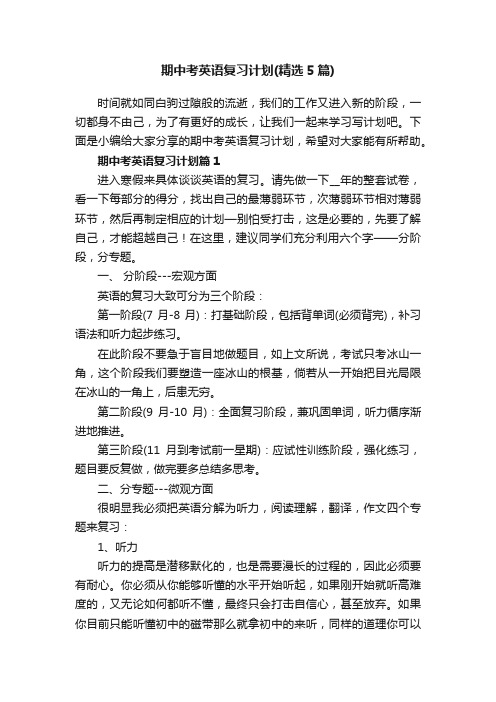
期中考英语复习计划(精选5篇)时间就如同白驹过隙般的流逝,我们的工作又进入新的阶段,一切都身不由己,为了有更好的成长,让我们一起来学习写计划吧。
下面是小编给大家分享的期中考英语复习计划,希望对大家能有所帮助。
期中考英语复习计划篇1进入寒假来具体谈谈英语的复习。
请先做一下__年的整套试卷,看一下每部分的得分,找出自己的最薄弱环节,次薄弱环节相对薄弱环节,然后再制定相应的计划—别怕受打击,这是必要的,先要了解自己,才能超越自己!在这里,建议同学们充分利用六个字——分阶段,分专题。
一、分阶段---宏观方面英语的复习大致可分为三个阶段:第一阶段(7月-8月):打基础阶段,包括背单词(必须背完),补习语法和听力起步练习。
在此阶段不要急于盲目地做题目,如上文所说,考试只考冰山一角,这个阶段我们要塑造一座冰山的根基,倘若从一开始把目光局限在冰山的一角上,后患无穷。
第二阶段(9月-10月):全面复习阶段,兼巩固单词,听力循序渐进地推进。
第三阶段(11月到考试前一星期):应试性训练阶段,强化练习,题目要反复做,做完要多总结多思考。
二、分专题---微观方面很明显我必须把英语分解为听力,阅读理解,翻译,作文四个专题来复习:1、听力听力的提高是潜移默化的,也是需要漫长的过程的,因此必须要有耐心。
你必须从你能够听懂的水平开始听起,如果刚开始就听高难度的,又无论如何都听不懂,最终只会打击自信心,甚至放弃。
如果你目前只能听懂初中的磁带那么就拿初中的来听,同样的道理你可以听高中的,大学一年级的,二年级的,三年级的,四级的,六级的,总之任何一盘磁带都可以作为你的开始,关键在于它是否适合你目前的听力水平。
当你觉得可以完全听懂且能够复述大概意思,甚至能够随时记下所听到的关键字词甚至一个完整句子的时候,你就可以提高到下一个难度了。
注意在11月份以前的阶段,听力必须以“精听”为主,“泛听”对于提高听力帮助不大!2、阅读理解要想得高分,阅读理解是关键,是重中之重,在这里主要说一下模拟题和真题的使用。
英语期中复习学习计划(16篇)
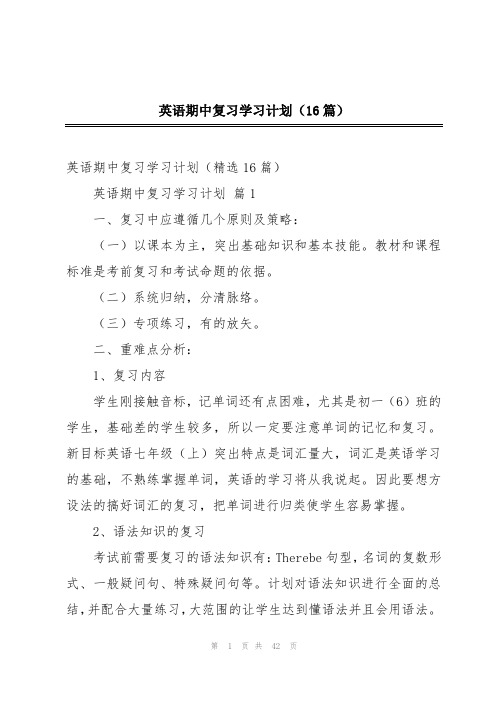
英语期中复习学习计划(16篇)英语期中复习学习计划(精选16篇)英语期中复习学习计划篇1一、复习中应遵循几个原则及策略:(一)以课本为主,突出基础知识和基本技能。
教材和课程标准是考前复习和考试命题的依据。
(二)系统归纳,分清脉络。
(三)专项练习,有的放矢。
二、重难点分析:1、复习内容学生刚接触音标,记单词还有点困难,尤其是初一(6)班的学生,基础差的学生较多,所以一定要注意单词的记忆和复习。
新目标英语七年级(上)突出特点是词汇量大,词汇是英语学习的基础,不熟练掌握单词,英语的学习将从我说起。
因此要想方设法的搞好词汇的复习,把单词进行归类使学生容易掌握。
2、语法知识的复习考试前需要复习的语法知识有:Therebe句型,名词的复数形式、一般疑问句、特殊疑问句等。
计划对语法知识进行全面的总结,并配合大量练习,大范围的让学生达到懂语法并且会用语法。
由此,减少或解除学生心中模糊的知识。
复习语法时,要注重引导学生记住结构,能灵活运用到实际生活中去,运用学过的语法写句子,写出简单的文章。
3.习题的选择:本学期七年级的内容多,容量大,时间紧。
必须重视习题的质量。
针对这种情况要精选部分试题进行强化训练,特别是学生容易错的,在复习中多加以巩固。
三、复习时间安排:利用6天的时间,单词、语法、习题三项要彼此兼顾,要处理好三者之间的关系。
四、复习内容在教材整体结构中的'作用:七年级学生刚刚使用新教材,知识的跨度较大,不少同学感到力不从心。
因此,本次复习关系重大。
对于学生知识的系统性,学习英语的自信心等都有极大的关系。
预备级和module1__3单元有选择的重点复习。
复习过程中以学生自检与教师检查相结合,及时反馈学习效果,注重复习的有效性。
五、倾向性问题及需要注意的问题:有关课本的知识的要求,应该分层次进行。
因为基础知识内容过多,要求所有同学全部掌握是不可能的。
因此要进行分层次教学。
练习过程中采取逐步引导,渗透作题技巧,要注意培养学生的分析问题能力、解决问题能力。
七年级英语复习计划范文

七年级英语复习计划范文七年级英语复习规划1一、复习中留意的几个原则:一是抓住课本,有效复习。
教材和教学大纲是考前复习和考试命题的依据。
二是系统归纳,分清脉络。
三是专项练习,有的放矢。
二、复习思路:在复习中,要求学生学会整理错题,把试卷和做过的练习题里的错题整理出来,特地抄写在一个本子上,准时订正反应。
教师要加以选择,并要求学生有选择性地做根底学问练习,让学生走出题海。
关于阅读理解,现在出题内容越来越接近生活,因此,学生复习时应加强阅读量、提高阅读速度,广泛接触各种题材、体裁的文章,拓展学问面,同时要有意识地积存各种题型的解题方法和技巧,从而可削减中考时的答题失误。
(一)立足根底。
7—12单元为复习重点,复习时要强调根底学问,建议学生将已学过的语法学问进展归纳分类,以便使零散的学问连贯起来。
将动词,句型作为复习重点,复习其他词类时多关注固定用法、平常常见的错误及教师课堂上提出应留意问题等。
1—6单元有选择的”重点复习。
复习过程中以学生自检与教师检查相结合,准时反应学习效果,注意复习的有效性。
(二)查缺补漏。
复习时要强调针对性和有效性。
不搞题海战术,把各种针对性比拟强的综合训练作为检查存在缺乏的工具,重点突破那些平常没有娴熟把握的内容。
(三)注意复习技巧。
现在复习时就应实行正确的解题技巧、思路和方法,包括在进展听力训练时。
复习时把各类题型进展分析、归类,把握解题方法,这样才能在解题时多角度深入地理解题意,拓宽解题思路。
(四)对不同学生进展必要的分类指导和心理辅导。
一个班级,总是存在着学生的差异。
在复习中,用一个标准来要求全部学生,是不太妥当的。
对优生而言,严格要求,加大难度;对中等生、一般学生而言,要求他们稳固所学,力求进步;对后进生而言,应耐着性子,加大情感投入,让他们体会到教师们的良苦专心,尽可能搞好学习。
(五)依据考试题型,有的放矢,进展专项练习。
依据期中考试试卷分析消失的问题,加强学生听力及作文的练习。
七年级英语期中考试备考计划
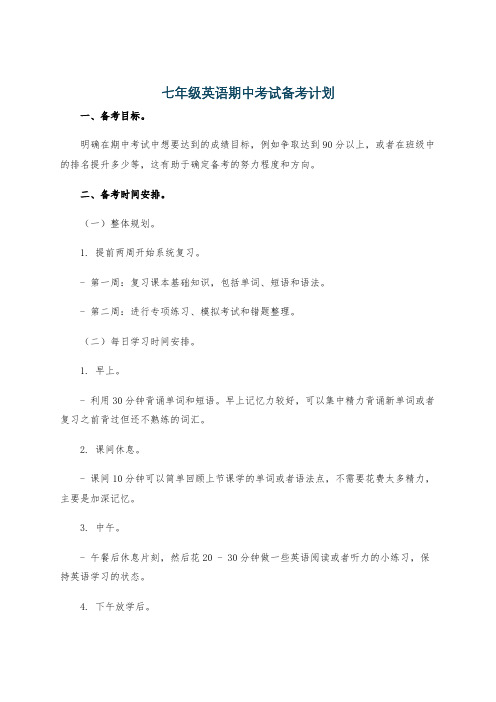
七年级英语期中考试备考计划一、备考目标。
明确在期中考试中想要达到的成绩目标,例如争取达到90分以上,或者在班级中的排名提升多少等,这有助于确定备考的努力程度和方向。
二、备考时间安排。
(一)整体规划。
1. 提前两周开始系统复习。
- 第一周:复习课本基础知识,包括单词、短语和语法。
- 第二周:进行专项练习、模拟考试和错题整理。
(二)每日学习时间安排。
1. 早上。
- 利用30分钟背诵单词和短语。
早上记忆力较好,可以集中精力背诵新单词或者复习之前背过但还不熟练的词汇。
2. 课间休息。
- 课间10分钟可以简单回顾上节课学的单词或者语法点,不需要花费太多精力,主要是加深记忆。
3. 中午。
- 午餐后休息片刻,然后花20 - 30分钟做一些英语阅读或者听力的小练习,保持英语学习的状态。
4. 下午放学后。
- 安排1.5 - 2小时进行系统复习。
- 前30分钟复习当天学习的内容,整理笔记。
- 接下来60 - 90分钟按照复习计划进行专项复习,如语法复习、做练习题等。
三、复习内容及方法。
(一)单词。
1. 背诵课本单词表。
- 每天背诵一个单元的单词,采用多种记忆方法,如联想法、词根词缀法等。
例如,“pest”(害虫),可以联想成“拍死它”。
- 背诵时要注意单词的发音、拼写、词义和词性。
2. 制作单词卡片。
- 将单词写在卡片的一面,词义、词性和例句写在另一面。
随时随地可以拿出来复习,比如在公交车上或者排队的时候。
3. 利用手机APP辅助学习。
- 如百词斩、墨墨背单词等APP,里面有多种学习模式,可以增加学习的趣味性,同时也方便统计学习进度。
(二)短语。
1. 整理课本中的短语。
- 按照单元顺序,将每个单元的重点短语整理出来,写在笔记本上。
例如,“be good at”(擅长),“look forward to”(期待)等。
2. 背诵与运用相结合。
- 在背诵短语的同时,要学会运用它们造句。
通过造句可以加深对短语的理解和记忆,同时也能提高语言运用能力。
初一下册英语期中考试复习计划
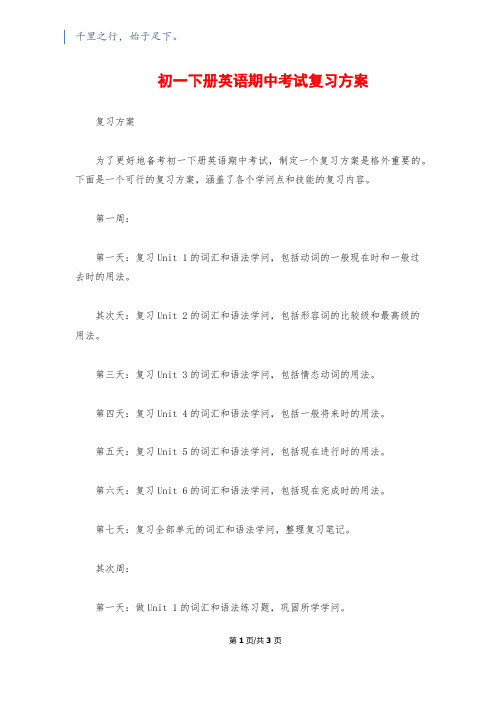
千里之行,始于足下。
初一下册英语期中考试复习方案复习方案为了更好地备考初一下册英语期中考试,制定一个复习方案是格外重要的。
下面是一个可行的复习方案,涵盖了各个学问点和技能的复习内容。
第一周:第一天:复习Unit 1的词汇和语法学问,包括动词的一般现在时和一般过去时的用法。
其次天:复习Unit 2的词汇和语法学问,包括形容词的比较级和最高级的用法。
第三天:复习Unit 3的词汇和语法学问,包括情态动词的用法。
第四天:复习Unit 4的词汇和语法学问,包括一般将来时的用法。
第五天:复习Unit 5的词汇和语法学问,包括现在进行时的用法。
第六天:复习Unit 6的词汇和语法学问,包括现在完成时的用法。
第七天:复习全部单元的词汇和语法学问,整理复习笔记。
其次周:第一天:做Unit 1的词汇和语法练习题,巩固所学学问。
第1页/共3页锲而不舍,金石可镂。
其次天:做Unit 2的词汇和语法练习题,巩固所学学问。
第三天:做Unit 3的词汇和语法练习题,巩固所学学问。
第四天:做Unit 4的词汇和语法练习题,巩固所学学问。
第五天:做Unit 5的词汇和语法练习题,巩固所学学问。
第六天:做Unit 6的词汇和语法练习题,巩固所学学问。
第七天:做模拟试卷,检测学习成果。
第三周:第一天:查漏补缺,复习有疑问的学问点。
其次天:做错题集,分析错误缘由。
第三天:做过去两年的期中考试题库,生疏考试形式。
第四天:复习重点句型和语法学问。
第五天:复习写作技巧,包括作文结构和句型。
第六天:进行口语练习,口头表达力量。
第七天:放松心情,保持良好状态。
总结:千里之行,始于足下。
复习方案依据初一下册英语教材的内容而定,涵盖了词汇、语法、听力、阅读、写作和口语等方面的复习内容。
每天都进行特地的复习,提高了对学问点的把握程度和练习的频率,同时也保证了复习进度的合理支配。
假如有时间可以补充一些其他的练习题目或者做一些课外阅读,以加强对英语的理解和运用。
七年级英语期中考试备考计划

七年级英语期中考试备考计划English:For the seventh-grade English midterm exam preparation plan, it's essential to begin by assessing the syllabus thoroughly, identifying key topics, and understanding the exam format. Next, allocate specific time slots each day for revision, focusing on different language skills such as reading comprehension, grammar, vocabulary, and writing. Utilize various resources like textbooks, online exercises, and past exam papers to practice and reinforce understanding. Additionally, engage in group study sessions or seek help from teachers for clarification on challenging concepts. Implement effective study techniques such as summarizing, making flashcards, and practicing with mock exams to enhance retention and improve performance under exam conditions. Prioritize regular breaks and maintain a balanced lifestyle to avoid burnout and ensure optimal concentration during study sessions. Lastly, stay motivated and maintain a positive mindset by setting achievable goals and celebrating progress along the way.中文翻译:对于七年级英语期中考试备考计划,首先要彻底评估教学大纲,确定重点内容,并了解考试形式。
初一下册英语期中考试复习计划1200字

千里之行,始于足下。
初一下册英语期中考试复习方案
初一下册英语期中考试复习方案:
1. 了解考试内容和要求:认真争辩教材中的每个单元、每个主题,了解考试的题型和考察的重点。
2. 温故知新:复习上学期所学的学问,回顾复习教材中的重点、难点,确保把握。
3. 制定学习方案:依据考试内容,制定每天的学习方案,合理安排时间。
4. 多听多说:听英语广播、英语歌曲、看英语电影等,提高英语听力力量。
5. 多读多写:读英语故事、英语文章,提高英语阅读理解力量;多写英语作文,提高英语写作力量。
6. 学好词汇和语法:重点复习课本中的词汇和语法学问,加强练习。
7. 写作练习:每天都进行英语写作练习,包括看图写话、写日记、写邮件等,提高写作力量。
8. 听力练习:每天进行听力练习,可以选择一些英语听力材料进行听写和仿照。
9. 口语练习:和同学或者老师进行英语对话练习,提高口语表达力量。
10. 解题技巧:争辩各类题型的解题技巧,积累答题阅历。
第1页/共2页
锲而不舍,金石可镂。
11. 模拟考试:在考试前进行模拟考试,检验复习效果,准时调整复习方案。
12. 留意调整:保持良好的心态,遇到困难准时调整,保持乐观的学习态度。
以上是初一下册英语期中考试复习方案,期望对你有挂念!。
七年级英语期中备考计划
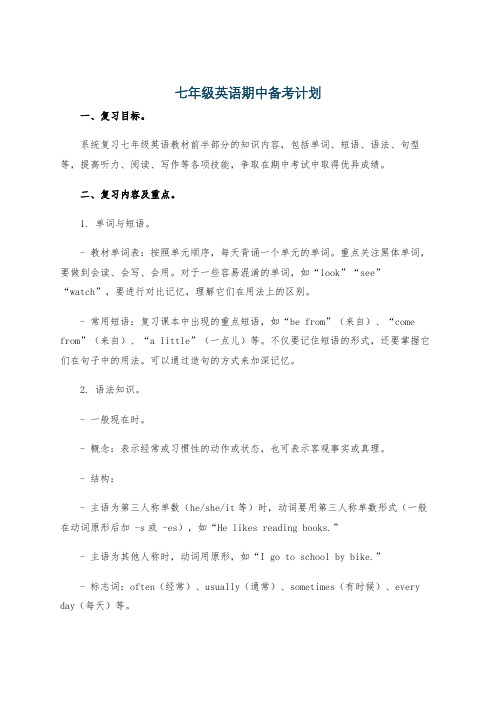
七年级英语期中备考计划一、复习目标。
系统复习七年级英语教材前半部分的知识内容,包括单词、短语、语法、句型等,提高听力、阅读、写作等各项技能,争取在期中考试中取得优异成绩。
二、复习内容及重点。
1. 单词与短语。
- 教材单词表:按照单元顺序,每天背诵一个单元的单词。
重点关注黑体单词,要做到会读、会写、会用。
对于一些容易混淆的单词,如“look”“see”“watch”,要进行对比记忆,理解它们在用法上的区别。
- 常用短语:复习课本中出现的重点短语,如“be from”(来自)、“come from”(来自)、“a little”(一点儿)等。
不仅要记住短语的形式,还要掌握它们在句子中的用法。
可以通过造句的方式来加深记忆。
2. 语法知识。
- 一般现在时。
- 概念:表示经常或习惯性的动作或状态,也可表示客观事实或真理。
- 结构:- 主语为第三人称单数(he/she/it等)时,动词要用第三人称单数形式(一般在动词原形后加 -s或 -es),如“He likes reading books.”- 主语为其他人称时,动词用原形,如“I go to school by bike.”- 标志词:often(经常)、usually(通常)、sometimes(有时候)、every day(每天)等。
- 名词的单复数。
- 规则变化:- 一般在名词后加 -s,如“book - books”。
- 以s、x、sh、ch结尾的名词,加 -es,如“box - boxes”。
- 以辅音字母 + y结尾的名词,把y变为i,再加 -es,如“city - cities”。
- 以o结尾的名词,有生命的加 -es(如“tomato - tomatoes”),无生命的加-s(如“photo - photos”)。
- 不规则变化:如“man - men”、“woman - women”、“child - children”等,需要特殊记忆。
七年级期中英语考试备考计划

七年级期中英语考试备考计划To prepare for the 7th grade midterm English exam, I have come up with a detailed study plan.Firstly, I will review all the vocabulary words and phrases covered in class. I will create flashcards to help me memorize the words and their meanings. I will also practice using the words in sentences to ensure I understand how to use them correctly.Secondly, I will focus on improving my grammar skills. I will review the different tenses, sentence structures, and parts of speech. I will practice writing sentences and paragraphs using proper grammar rules.Next, I will work on my reading comprehension skills. I will read a variety of texts, including articles, short stories, and poems. I will practice identifying main ideas, supporting details, and making inferences.In addition, I will practice my listening skills by watching English videos and listening to English podcasts. This will help me improve my ability to understand spoken English and different accents.Furthermore, I will practice my writing skills by writing essays, letters, and journal entries. I will focus on organizing my ideas, using proper grammar and punctuation, and writing clearly and cohesively.Lastly, I will take practice exams to simulate the test-taking experience. This will help me become familiar with the format of the exam and improve my time management skills.通过以上的备考计划,我相信我能在期中考试中取得好成绩。
期中考试英语复习计划
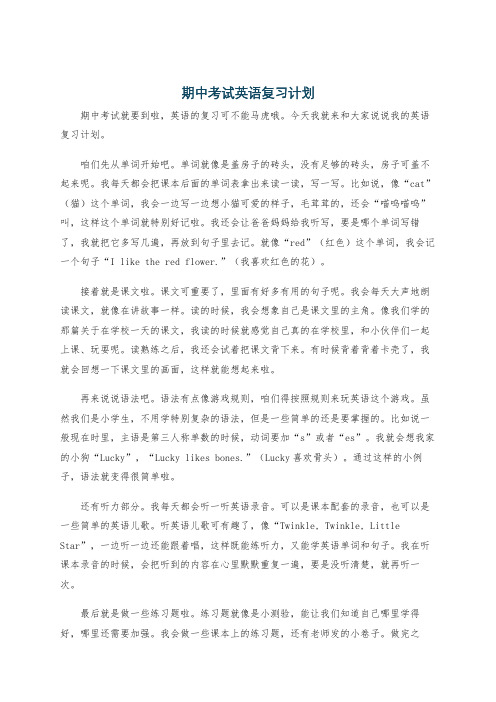
期中考试英语复习计划期中考试就要到啦,英语的复习可不能马虎哦。
今天我就来和大家说说我的英语复习计划。
咱们先从单词开始吧。
单词就像是盖房子的砖头,没有足够的砖头,房子可盖不起来呢。
我每天都会把课本后面的单词表拿出来读一读,写一写。
比如说,像“cat”(猫)这个单词,我会一边写一边想小猫可爱的样子,毛茸茸的,还会“喵呜喵呜”叫,这样这个单词就特别好记啦。
我还会让爸爸妈妈给我听写,要是哪个单词写错了,我就把它多写几遍,再放到句子里去记。
就像“red”(红色)这个单词,我会记一个句子“I like the red flower.”(我喜欢红色的花)。
接着就是课文啦。
课文可重要了,里面有好多有用的句子呢。
我会每天大声地朗读课文,就像在讲故事一样。
读的时候,我会想象自己是课文里的主角。
像我们学的那篇关于在学校一天的课文,我读的时候就感觉自己真的在学校里,和小伙伴们一起上课、玩耍呢。
读熟练之后,我还会试着把课文背下来。
有时候背着背着卡壳了,我就会回想一下课文里的画面,这样就能想起来啦。
再来说说语法吧。
语法有点像游戏规则,咱们得按照规则来玩英语这个游戏。
虽然我们是小学生,不用学特别复杂的语法,但是一些简单的还是要掌握的。
比如说一般现在时里,主语是第三人称单数的时候,动词要加“s”或者“es”。
我就会想我家的小狗“Lucky”,“Lucky likes bones.”(Lucky喜欢骨头)。
通过这样的小例子,语法就变得很简单啦。
还有听力部分。
我每天都会听一听英语录音。
可以是课本配套的录音,也可以是一些简单的英语儿歌。
听英语儿歌可有趣了,像“Twinkle, Twinkle, Little Star”,一边听一边还能跟着唱,这样既能练听力,又能学英语单词和句子。
我在听课本录音的时候,会把听到的内容在心里默默重复一遍,要是没听清楚,就再听一次。
最后就是做一些练习题啦。
练习题就像是小测验,能让我们知道自己哪里学得好,哪里还需要加强。
初一英语期中复习计划

初一英语期中复习计划导语:新学期开始了,但是转眼之间期中考试就快到了。
考试的目的就是为了检验自己之前所学的知识,所以为了考出令人满意的成绩我们不妨为自己做如下计划。
一夯实基础复习阶段针对学生对已学基础知识,本着“依纲靠本”和“温故知新”的原则,要求学生一步一个脚印,扎扎实实搞好基础知识的复习。
在复习过程中,还要采取一些必要的措施来巩固和增强复习效果。
如做到:根据复习内容,布置适量的难度适中的练习(教师自己出的练习)。
二抓漏补缺,全面提高复习要求突出重点,牢固掌握。
要求学生对那些在教材中多次出现和辅导教材中一再提及,反复强调部分,应视为重点,格外加以注意。
同时有针对性地指导学生记忆的方法,培养记忆能力。
要求教师在复习过程中防止简单的重复,而是遵循精讲多综的原则,做到讲——练——评结合。
既要教学生解题要领,帮助学生理解题目与题目之间的联系,同时又针对考试题型强化训练,使学生在答题时做到灵活运用,触类旁通,举一反三。
三加强解题训练考前指导与适应性训练,主要目的是适应考试要求,提高应试技巧。
侧重培养学生审题解题能力,同时要在教师指导下进行练习。
总之,通过上述复习,使学生从不同角度得到反复的复习和强化练习由浅入深,既有点的知识,又有面的综合,使知识系统化,使能力得到提高、加强。
做到着眼全面,突出重点,点面结合,把全面复习和重点复习有机结合起来。
这样既系统全面又有所侧面的复习1.单词的复习新目标英语七年级(上)突出特点是词汇量大,词汇是英语学习的基础,不熟练掌握单词,英语的学习将从我说起。
因此要想方设法的搞好词汇的复习,把单词进行归类使学生容易掌握。
2、语法知识的复习考试前需要复习的语法知识有:一般现在时、名词的复数形式、一般疑问句、特殊疑问句等。
计划对语法知识进行全面的总结,并配合大量练习,大范围的让学生达到懂语法并且会用语法。
由此,减少或解除学生心中模糊的知识。
复习语法时,要注重引导学生记住结构,能灵活运用到实际生活中去,运用学过的语法写句子,写出简单的文章。
初一下册英语期中考试复习计划

初一下册英语期中考试复习计划1.初一下册英语期中考试复习计划一、抓好英语的常规教学,确保基础知识过关(一)单词过关利用自修时间、早读时间,由科代表主持听写、默书。
(二)词组过关1、把学过的词组归纳,方便学生记忆。
2、用词组造句和中译英训练。
在各个教学班内进行竞赛。
3、句型过关组织学生结对子,一有空就你问我答,营造学习氛围,同时加强笔头的练习,使学生能熟能生巧。
4、课文过关把课文分段,按学习组为单位,进行朗读比赛,对学过的课文尽量做到人人会背,有些课文还要求学生会默写。
二、抓好语法学习1、掌握形容词、副词的.比较级和级的构成和用法。
区分单音节词和多音节词的构成,规则和不规则变化。
2、学习一般过去时态,重点突破不规则动词。
3、学习过去进行时与现在进行时的区别。
4、学习联系词的用法。
三、培养学生综合运用知识的能力每个单元围绕着知识点反复训练,层层渗透。
每个单元结束都进行测验,找出存在问题,及时补漏补缺。
四、抓好阅读能力培养每周规定学生阅读三篇短文,带着问题阅读,阅读之后要回答问题。
五、培养学生写作能力逐步创作一些简笔画要学生写出他们的动作编成故事,逐步培养他们看图写话的能力。
六、促进全体同学共同进步抓尖子培养,努力做好后进生转化工作,促进全体学生共同进步。
1、指定学习成绩好的学生利用业余时间多读和多做课外书,每月进行一次知识竞赛,评出级组学习积极分子。
2、多关心后进生的思想和学习,平时要检查和督促他们的作业及时给予他们帮助。
2.初一下册英语期中考试复习计划【一】本学期的指导思想:在本学期的英语教学中,坚持以下理念的应用:1.要面向全体学生,关注每个学生的情感,激发他们学习英语的兴趣,帮助他们建立学习的成就感和自信心,培养创新精神;2.整体设计目标,体现灵活开放,目标设计以学生技能,语言知识,情感态度,学习策略和文化意识的发展为基础;3.突出学生主体,尊重个体差异;4.采用活动途径,倡导体验参与,即采用任务型的教学模式,让学生在老师的指导下通过感知、体验、实践、参与和合作等方式,实现任务的目标,感受成功;5.注重过程评价,促进学生发展,建立能激励学生学习兴趣和自主学习能力发展的评价体系。
初一年级英语考试不同阶段的复习策略

初一年级英语考试不同阶段的复习策略在初一年级的英语学习旅程中,考试复习如同一场精心策划的探险。
每个阶段的复习策略都是通向成功的一把钥匙,通过巧妙地组合与调整,能够帮助学生们更有效地掌握知识、提升能力。
首先,在复习的初期,焦点应放在基础知识的巩固上。
此时,学生们就像刚开启探险之旅的小勇士,需要先熟悉周围的环境。
此阶段可以通过系统的复习课本内容,注重词汇、语法和句型的学习。
每天设定小目标,例如每天记忆十个新单词,并将其运用到简单的句子中。
通过反复练习,使这些基础知识铭记于心,为后续的学习打下坚实的基础。
接下来,进入复习的中期阶段,学生们已经积累了一定的知识储备,此时应致力于综合应用与理解能力的提高。
这个阶段,学生们就像逐渐适应了探险环境的冒险者,开始探索更深层次的知识。
可以通过做模拟试题、参加小组讨论来促进学习。
模拟试题不仅能帮助学生了解考试形式,提升应试能力,还能让他们发现自己的薄弱环节,从而有针对性地进行强化。
在小组讨论中,学生们可以互相分享学习方法与经验,激发彼此的学习热情。
随着复习的深入,进入后期阶段,学生们需要将自己所学的知识进行系统整合。
这个阶段就如同探险中的关键时刻,勇士们需要运用所掌握的技能来应对各种挑战。
此时,可以通过创建思维导图或复习笔记的方式,将各类知识串联起来,加深对知识的理解。
此外,进行口语练习也是至关重要的,鼓励学生们跟随录音朗读、进行角色扮演,以提高他们的口语表达能力和听力理解水平。
在复习的最后阶段,学生们应当集中力量进行查漏补缺。
此时,探险者已走到目的地的边缘,面对即将到来的挑战,他们需要细致入微地检查自己的装备。
可选择与老师进行一对一的辅导,或者利用网络资源进行个性化学习。
针对自己在模拟考试中暴露出的薄弱项,制定专项训练计划,确保在真正的考试中不留遗憾。
此外,心理调适在整个复习过程中也不可忽视。
复习阶段可能会带来压力与焦虑,学生们需要学会调节自己的情绪。
可以通过适当的休息、运动以及与朋友的交流,缓解紧张情绪,保持积极的学习态度。
初一英语复习计划

初一英语复习计划初一英语复习方案时间在消逝,从不停留,我们的工作又将在劳碌中充实着,在喜悦中收获着,马上行动起来写一份方案吧。
方案怎么写才能发挥它最大的作用呢?下面是我细心整理的初一英语复习方案,盼望对大家有所关心。
初一英语复习方案1本学期学习已进入总复习阶段,这一阶段很重要,它是同学学习力量总结提高的关键阶段。
为了使同学的更坚固更系统的把握英语学问,特制定英语复习方案如下:初一英语复习共八个模块,支配三周时间。
分两个阶段:模块复习,专项复习。
第一阶段,模块复习第一步:早读支配,复习基础学问:单词、短语、课文的背诵。
检测早读背诵内容,方法是:听写、小组检查。
其次步:课堂支配,复习每个模块内容:1、重点语法复习。
2、重点短语复习。
3、重点句子复习。
4、每个模块的复习题。
复习方法:1、就同学整理概括内容进行小组之间沟通补充。
2、老师的分析讲解。
3、老师提问。
4、老师讲题和同学讲题的协作。
其次阶段:专题复习包括:基础学问积累运用,听力复习,阅读复习,作文复习。
复习方法:1、基础学问的复习,印发试卷,巩固课文基本的内容。
2、听力复习,关心同学学习听听力的技巧。
3、阅读复习,选择合适的文章进行阅读训练,每模块选择两篇共20篇。
方法:同学阅读做题,老师讲解分析,总结题型归纳解题方法,提高同学的阅读力量。
4、作文复习,阅读范文,在同学学习文章中提高写作方法,留意作文开头、结尾的语言进行仿照。
英语复习以基础为主,采纳听、说、读、写、练各种方法,综合提高同学的各种力量。
初一英语复习方案2接近期末,面对复习。
说实在的,对于一个新老师来说,我有点束手无策。
除了利用学校供应的复习方法,以下是我个人复习方案。
初一上册英语共十二个单元,时间紧、任务重。
我们新课结束,还剩四天的复习时间。
如何合理的利用这四天时间,以下是我个人的支配。
一、依据章节先把相同学问点归类。
事先要对教材学问点进行横向的把握,这样有利于明确复习方向,提高复习效率。
- 1、下载文档前请自行甄别文档内容的完整性,平台不提供额外的编辑、内容补充、找答案等附加服务。
- 2、"仅部分预览"的文档,不可在线预览部分如存在完整性等问题,可反馈申请退款(可完整预览的文档不适用该条件!)。
- 3、如文档侵犯您的权益,请联系客服反馈,我们会尽快为您处理(人工客服工作时间:9:00-18:30)。
初一英语期中复习计划
导语:新学期开始了,但是转眼之间期中考试就快到了。
考试的目的就是为了检验自己之前所学的知识,所以为了考出令人满意的成绩我们不妨为自己做如下计划。
一夯实基础
复习阶段针对学生对已学基础知识,本着“依纲靠本”和“温故知新”的原则,要求学生一步一个脚印,扎扎实实搞好基础知识的复习。
在复习过程中,还要采取一些必要的措施来巩固和增强复习效果。
如做到:根据复习内容,布置适量的难度适中的练习(教师自己出的练习)。
二抓漏补缺,全面提高
复习要求突出重点,牢固掌握。
要求学生对那些在教材中多次出现和辅导教材中一再提及,反复强调部分,应视为重点,格外加以注意。
同时有针对性地指导学生记忆的方法,培养记忆能力。
要求教师在复习过程中防止简单的重复,而是遵循精讲多综的原则,做到讲——练——评结合。
既要教学生解题要领,帮助学生理解题目与题目之间的联系,同时又针对考试题型强化训练,使学生在答题时做到灵活运用,触类旁通,举一反三。
三加强解题训练
考前指导与适应性训练,主要目的是适应考试要求,提高应试技巧。
侧重培养学生审题解题能力,同时要在教师指
导下进行练习。
总之,通过上述复习,使学生从不同角度得到反复的复习和强化练习由浅入深,既有点的知识,又有面的综合,使知识系统化,使能力得到提高、加强。
做到着眼全面,突出重点,点面结合,把全面复习和重点复习有机结合起来。
这样既系统全面又有所侧面的复习
1.单词的复习
新目标英语七年级(上)突出特点是词汇量大,词汇是英语学习的基础,不熟练掌握单词,英语的学习将从我说起。
因此要想方设法的搞好词汇的复习,把单词进行归类使学生容易掌握。
2、语法知识的复习
考试前需要复习的语法知识有:一般现在时、名词的复数形式、一般疑问句、特殊疑问句等。
计划对语法知识进行全面的总结,并配合大量练习,大范围的让学生达到懂语法并且会用语法。
由此,减少或解除学生心中模糊的知识。
复习语法时,要注重引导学生记住结构,能灵活运用到实际生活中去,运用学过的语法写句子,写出简单的文章。
3.习题的选择:
本学期七年级的内容多,容量大,时间紧。
必须重视习题的质量。
针对这种情况要精选部分试题进行强化训练,特别是学生容易错的,在复习中多加以巩固。
新学期开始了,但是转眼之间期中考试就快到了。
考试的目的就是为了检验自己之前所学的知识,所以为了考出令人满意的成绩我们不妨为自己做如下计划:
关于听力
1.坚持每天听(听教材的配套磁带,听课外材料)
2.坚持每天读(听力和口语是相辅相成的,知道怎么读才能听得出发音)
3.坚持重复(听力不怕重复,多听几遍,反复琢磨每个词是怎么发音的,尽量模仿)
关于单选
1.每天做作业之前先看笔记
2.举一反三(每道题都该说出为什么选A而不选BCD)
3.及时把错题整理到错题本,经常翻看。
关于完成句子
1.注重单词积累
2.平时注意主动训练自己同义句转换
3.注重各种近义短语、固定搭配之间的区别
关于阅读
1.先题后文,带着问题找答案
2.一天一篇,坚持不懈(5分钟)
关于写作
每两天分析一篇满分作文,模仿写作思路,一周至少写
两篇作文,每篇用时不超过15分钟
养成写日记的好习惯。
分数由能力决定,能力由习惯决定,习惯由坚持养成!。
